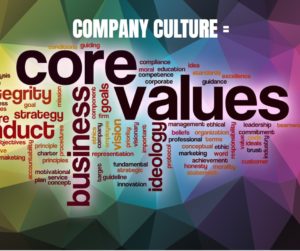 This year’s spotlights on Wells Fargo and Equifax came at a time when company culture is such a buzz word that employers who don’t have a game room or a fridge full of fresh fruit and organic snacks feel inadequate when trying to lure workers. Now, I’m sure you’re wondering what the connection is between office perks and the irresponsible behavior of Wells Fargo and Equifax.
This year’s spotlights on Wells Fargo and Equifax came at a time when company culture is such a buzz word that employers who don’t have a game room or a fridge full of fresh fruit and organic snacks feel inadequate when trying to lure workers. Now, I’m sure you’re wondering what the connection is between office perks and the irresponsible behavior of Wells Fargo and Equifax.
The connection is simple; it’s just buried. That’s because, in a hot job market, we’ve distorted the meaning of “company culture” by making it all about the perks, the good times and the benefit of working for Such-and-Such company, when, in reality, company culture is about attitude, belief systems, and the ways in which a company faces problems.
A couple of months ago, a client of Vivo asked me to do a management review and help them figure out all their policies to ensure people were being treated fairly across the board. To get started, I asked my client about their company culture. My client was immediately frustrated. Now was not the time to talk about the fun factor and office perks. I explained that’s not what I needed to know. I told my client that culture is deeper than that. If the company has a no-frills culture in which everyone works hard, gets paid well and is committed to making the right ethical decisions all the time, that defines their culture. On the other hand, if people are happy to drink the proverbial Kool-Aid and have fun, for lower pay, then that, too, can define their culture. Both are fine. But if a few “squeaky wheels” in either scenario can grab management’s attention and earn higher pay for the same work, then there’s an ideological flaw in the company culture.
Wells Fargo and Equifax are testifying before Congress over things that are little more than company culture. They are great examples of why company culture is not about soft skills and hiring good people who worked together well. Instead, both Wells Fargo and Equifax proved that they have “sweep it under the rug” cultures. Belief systems and unspoken policies are as much a part of company culture as are camaraderie, collaboration and team work.
In ordering people to open fake accounts and misrepresent profits, Wells Fargo showed how deep its culture chasm goes. People at all levels were afraid to speak up about what they knew was wrong. For all we know, those who aided in opening fake accounts may have been so brainwashed by the “hide it” nature of their company culture, that they didn’t believe they were doing anything wrong.
Meanwhile, people at all levels at Equifax were so scared that their own wrongdoing would affect their numbers that, even when they learned of a breach affecting hundreds of thousands of people, they didn’t bring it forward and address it immediately.
So, here we have two companies operating with a “meet the numbers at all costs” or a “sweep it under the rug” mindset. And somehow, that culture runs so deep in each company that people believe this behavior is acceptable. Belief systems are flawed. Unspoken policies get absorbed into employee consciousness. Bad decisions happen. And, until the culture is reworked, the cycle repeats.
When consulting with my client who was experiencing what they at first perceived as policy issues, I explained that behind every policy is a mindset, a belief system, and a way of operating that follows that belief system. Ways of operating based on beliefs make up the fabric of a company’s culture, which feeds the machine. Well-oiled by a clearly defined and managed set of reputable beliefs, the machine will run smoothly. But when the machine gets stuck, it’s time to figure out where, or with whom, the company’s values were lost.
